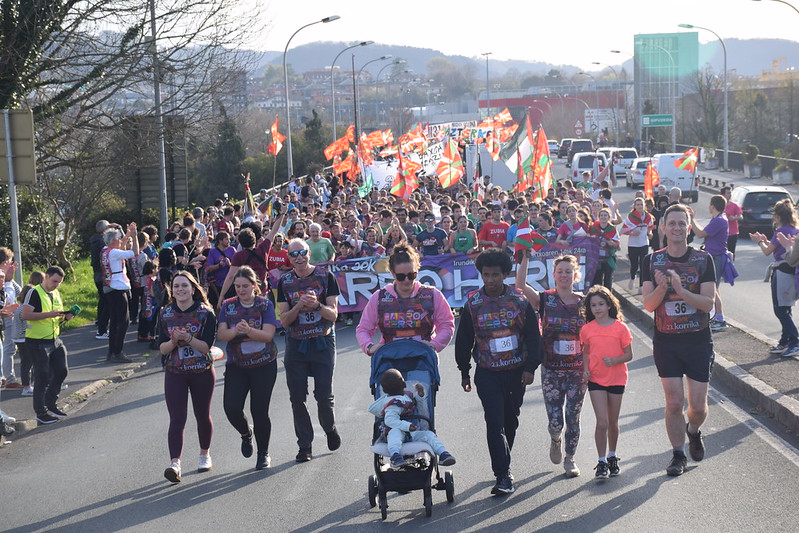
- Thousands of Euskaltzales have jointly undertaken 23. Korrika, in the warm sun of 14 March and sheltered from smiles, as claimed in the opening ceremony by AEK coordinator Ane Elordi. They say that in Irun the Basque Country has been more rejected than in other cities of Gipuzkoa, being “a cosmopolitan city of passage”, but on Thursday they have shown that the Basque community is strong. The witness with secret messages has gone from Irún to Hendaia and on the bridge of Santiago have remembered that “Euskal Herria does not want borders”.

The illusion is evident in the Plaza de San Juan and the surrounding streets. Bidasoa’s head of AEK, Beñat Alzaga, has moved that the beginning of the Korrika has encouraged the “Basque ecosystem of Irún” and that the first kilometre is the “recognition” of the work carried out by AEK. Those who have travelled in eleven places in the Basque Country have also had the opportunity to meet Irun Euskaltzale, leaving aside prejudices.
“Do you forgive? I do not...” answered an old woman to a young man who comes from Gipuzkoa “indoors” when the act is about to begin. Another Iraqi erdaldun who knows exactly what running is? The woman rebuked her suspicions in majestic Spanish: “We have come to cheer because we have to protect and help such things.” The two 78-year-old ladies, “the post-war daughters,” are excited, claiming the language they were denied in their country.
Irune clarifies the Gipuzkoan of “interior” that has nothing to do with other peoples of Gipuzkoa, among other things because it has come to work many people from outside (officials, customs workers, police officers, civil guards, Renfe workers...) and has married the women of Gipuzkoa; two people have said that speaking in Basque was “poorly seen” and the Persian locals gave. They say that Irun lived a “cosmopolitan” city because he was a border town, but that at the same time being “at the crossing” accelerated the loss of language. They consider that there will be no proper transmission, because "if they really knew what happened, this would not be full of right".
Although both women have tried to Euskaldunize (one Basque mother, another from Castile), they claim that at almost 80 years old they have enough to drive like Korrika. Two Euskaltzales of Irun at the Korrika festival, who have passed the witness to the young and who consider the transmission of Euskera and culture necessary. They applauded the first kilometer on their side and did not repeat the motto "Let's Cry: Proud Irun" which is heard from the speakers of the van, but they did understand it.
Bridges yes, without limits
The kilometer of the bridge from Santiago de Irun to Hendaia has stayed too far to walk, but the messages claimed are well known: "Irun, host town", "Mugarik ez", "Nobody is illegal". Thousands of people have crossed the bridge between Joaldun, the txalaparta and the ikurrina of Vigo Esku and the flag of Navarra. To denounce these limitations and defend the rights of the people who migrate, AEK and the Irun Reception Network also celebrated the event “Hizkuntza mugarik ez”, in the absence of a few days of Korrika, and Alzaga recalls that it was “exciting and nice”. “It is unacceptable that the bridge becomes an obstacle by surface colour; bridges are steps, cohesion structures”. In Korrika, we also wanted to show that Euskal Herria is a welcoming people.
In Irun they have joined the Korrika atmosphere since Thursday morning, a special day for the locals. But Alzaga has specified that “throwing” the work of the months. The organizers said that the beginning of the popular initiative for the promotion of the Basque country was “a wager and a challenge” and they intended to “shake prejudice”. Perhaps the Irundarras themselves have overcome many prejudices and complexes, because they have seen that the Basque community of the city is more alive than they believed. Alzaga has proudly and emotionally affirmed that the organization of the Korrika has led the community to “compete, sew, know and open paths of collaboration”: “It has been terrible to see how people have climbed the wave and we have no intention of going down the foams.”
The coordinator of the Korrika, Ane Elordi, has called for the message to enter the witness and join the wave: “Euskal Herria is proud in the next eleven days! Go ahead Korrika!”